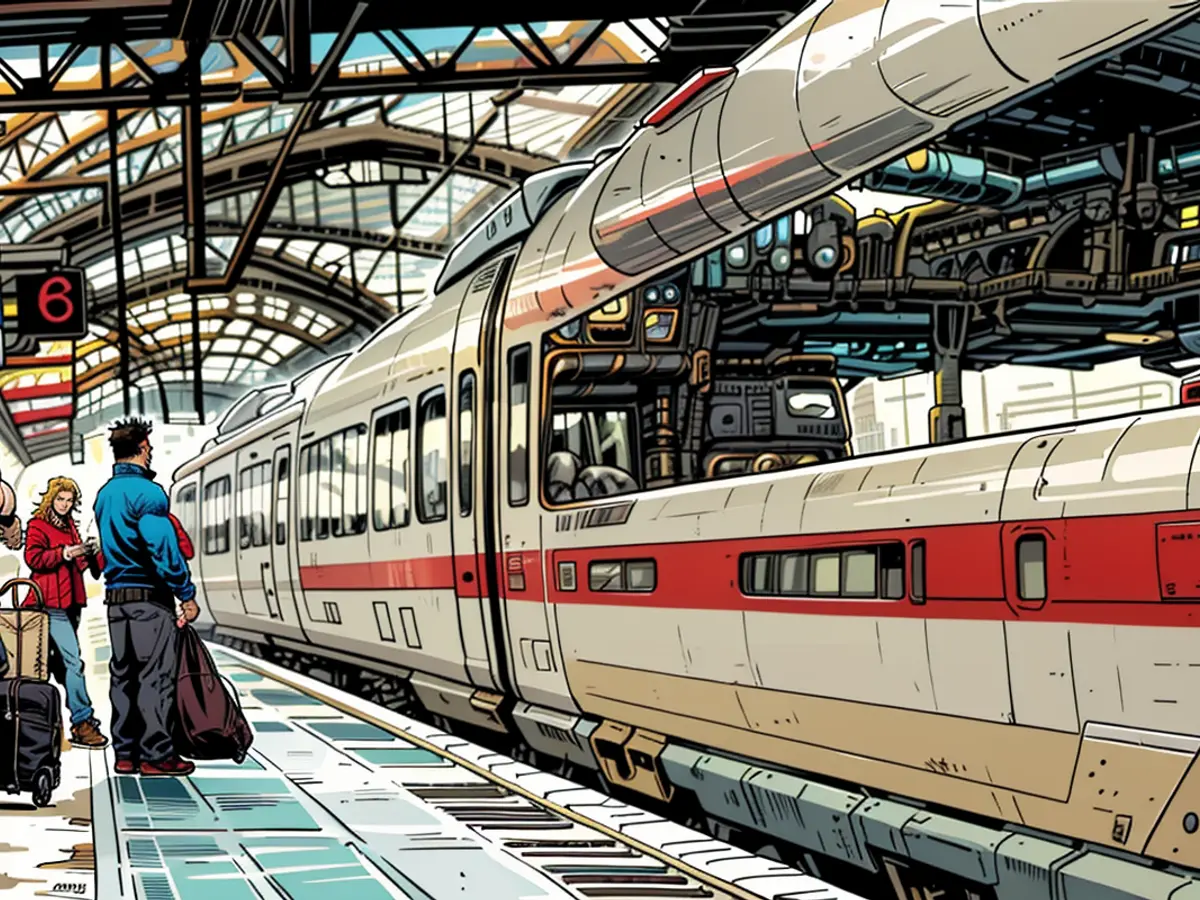Transport traffic - Construction site railway: There have been fewer long-distance trains for months
Construction sites continue to cause significant consequences for rail travelers in North Rhine-Westphalia. On Monday morning, Deutsche Bahn closed a crucial hub in Duisburg: A highway bridge carrying trains is being repaired there. Result: Until August 2, many trains in the western Ruhr area will be canceled in local traffic, passengers and commuters will have to switch to buses. In long-distance traffic, ICE trains will be rerouted extensively.
This is not the only place where the shoe pinches for the railways in the most populous federal state. On the one hand, the closure of a high-speed line between Cologne and Frankfurt, according to the Bahn website, is still ongoing until August 12 - the rerouting on another track significantly extends travel times. On the other hand, it has now been announced that important ICE tracks will be operated less frequently than before starting August 5 for over four months.
Politician addresses Bahn CEO
This comes from a letter from Transport Minister Oliver Krischer (Greens) to Bahn CEO Richard Lutz, which was obtained by dpa and first reported by WDR and WAZ. Two of the daily four ICE connections from Aachen to Berlin will be canceled, and other connections are also affected.
The Bahn stated that this is not a fundamental reduction but a temporary restriction until December 14. After that, the timetable change takes effect. There is unusually high construction activity along many railway lines nationwide. "This affects the available capacity on the infrastructure and operational stability, even beyond construction sites," says a Bahn spokesperson.
According to their statement, the consequences for long-distance travel in NRW are overall rather minor compared to the regular schedule. "There are still over 95% of long-distance trains running in NRW." With transfers, there will also be good alternatives for passengers. The Bahn spokesperson also notes that the Bahn in NRW will have established as many new long-distance connections in December 2023 as has not been the case in the last 20 years.
Criticism from the Minister
Is it all half as bad? The concerns on the forehead of the Green politician may not be smoothed out so easily. In his letter to Bahn CEO Lutz, he expresses critical remarks about the consequences for rail travelers in Nordrhein-Westfalen. The federal state seems to be "particularly affected" by the planned reductions, he complains. For some cities, the effects are "enormous."
"The cities of Herzogenrath, Geilenkirchen, Erkelenz, Rheydt, Mönchengladbach, Viersen and Krefeld will have to do without one of their two direct connections to Berlin." In Guetersloh, an ICE train only stops three times a day instead of six. In Herford, three of the four ICE stops are suspended for the time being. In Düren, one ICE stop is currently scheduled, but there will be no stops at all for the next four months.
Krischer also expresses concern that direct connections between Bonn and Berlin will be discontinued at the timetable change in mid-December. "That Bonn, the federal city, has to accept a significantly reduced long-distance transport offer with the elimination of five of the nine daily train pairs is not acceptable."
The politician warns against passengers being "forced" to switch to planes. This would counteract efforts to shift traffic to the railways and thus also the climate protection efforts, writes Krischer.
Pro Bahn sees missed transport politics
The passenger association Pro Bahn expresses criticism. "It will be uncomfortable for many passengers," says its federal chairman Detlef Neuß. "The railway must ensure that it does not further annoy the travelers." The restrictions due to construction sites are, however, understandable. "We have driven the network hard for 30 years, we have invested far too little money into the network - now we are experiencing the consequences of that."
On the railway website and in DB Navigator, passengers can retrieve the changed train schedules for the coming months - then they can see if they can still board an ICE train at their preferred departure time at their main station or if they have to travel to another station first to board the long-distance train.
- Despite the ongoing construction site in Duisburg, affecting German Railways, there are still over 95% of long-distance trains running in North Rhine-Westphalia.
- The highway bridge carrying trains in Duisburg is under repair, causing many trains in the western Ruhr area to be canceled until August 2.
- In long-distance traffic, ICE trains will be rerouted extensively due to the repairs in Duisburg.
- A high-speed line between Cologne and Frankfurt is still closed, leading to extended travel times for passengers.
- Starting August 5, important ICE tracks in North Rhine-Westphalia will be operated less frequently than before for over four months.
- Oliver Krischer, the Transport Minister of North Rhine-Westphalia, has expressed critical remarks about the consequences for rail travelers in the state.
- Cities like Herzogenrath, Geilenkirchen, Erkelenz, Rheydt, Moenchengladbach, Viersen, and Krefeld will have to do without one of their two direct connections to Berlin.
- Krischer also concerns that direct connections between Bonn and Berlin will be discontinued at the timetable change in mid-December.
- Pro Bahn, the passenger association, criticizes the railway for not ensuring that the travelers are not further annoyed due to the restrictions.
- The construction activities along many railway lines nationwide are affecting the available capacity on the infrastructure and operational stability, even beyond construction sites.








